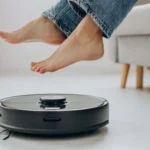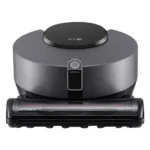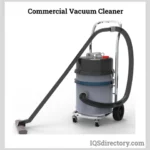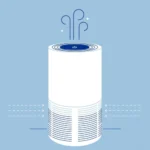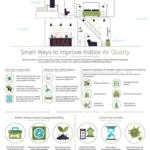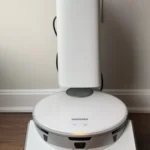Have you ever wondered why your allergies keep acting up, even though you frequently clean your house? The answer may lie in the quality of the air in your home. Airborne particles like dust, pollen, and pet dander can easily trigger allergies and other respiratory problems. This is where HEPA filters in canister vacuum cleaners come into play. But what exactly are HEPA filters, and why are they so important? This article will take a closer look at the benefits of using canister vacuum cleaners with HEPA filters, how they work, and tips for choosing the best one for your home.
What is a HEPA Filter?
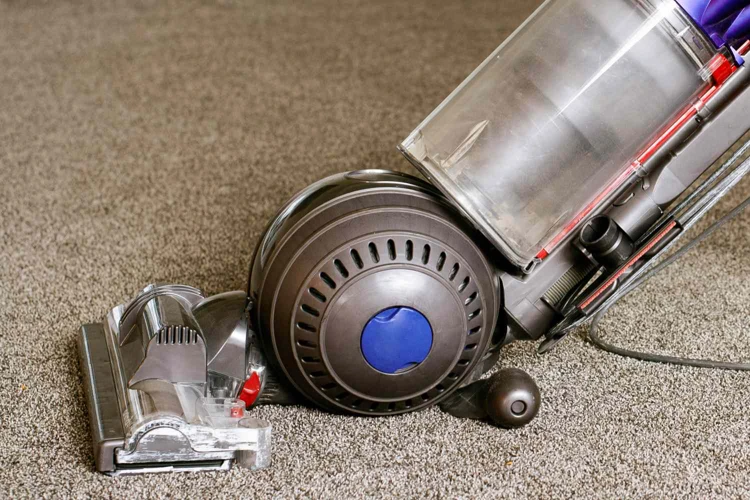
HEPA stands for High-Efficiency Particulate Air, and a HEPA filter is a type of air filter that is commonly used in air purifiers and vacuum cleaners. A HEPA filter is designed to capture tiny particles in the air that are invisible to the naked eye. These particles can include pet dander, dust mites, pollen, and even bacteria and viruses.
What Makes HEPA Filters Different?
HEPA filters are different from other types of filters because they are made up of a dense network of fibers that are able to trap particles as small as 0.3 microns. This means they can capture particles that are smaller than the diameter of a human hair.
How Do HEPA Filters Work?
HEPA filters work by forcing air through a fine mesh that traps particles as they pass through. The fibers in the mesh are arranged in a way that creates a large surface area for the air to pass through, which maximizes the chances of particles getting trapped. Over time, as more and more particles get trapped in the filter, the air flow can become restricted. This is why it is important to clean or replace HEPA filters regularly.
Why Are HEPA Filters Important for Allergies?
HEPA filters are important for allergies because they can capture many of the tiny particles that can trigger symptoms such as sneezing, coughing, and itchy eyes. By removing these particles from the air, HEPA filters can help improve air quality and reduce allergy symptoms.
How Can Canister Vacuum Cleaners with HEPA Filters Help?
Canister vacuum cleaners with HEPA filters are an effective way to remove allergens and other tiny particles from your home. As you vacuum, the machine sucks in air that is then filtered through the HEPA filter. This removes particles from the air and traps them in the filter, preventing them from being released back into your home.
To learn more about how canister vacuum cleaners work, check out our article on How Canister Vacuum Cleaners Work. If you’re interested in purchasing a canister vacuum cleaner with a HEPA filter, see our Canister Vacuum Chooser for help finding the right model for your needs.
What Makes HEPA Filters Different?
If you’re in the market for a vacuum cleaner, you’ve probably come across the term HEPA filter. You may be wondering what makes these filters different from other types of filters. HEPA stands for High-Efficiency Particulate Air, and the name speaks for itself. These filters are designed to trap even the tiniest of particles, making them ideal for anyone who suffers from allergies or wants to maintain a cleaner and healthier home environment. So, what sets HEPA filters apart from other filters on the market? Let’s find out. But first, check out our article on top 5 reasons to choose a canister vacuum.
How Do HEPA Filters Work?
HEPA filters are designed to capture microscopic particles that cannot be captured by other vacuum filters. They work by using a dense mat of randomly arranged fiberglass fibers. These fine fibers are designed to trap microscopic particles as they pass through the filter, while allowing air to pass through. Let’s take a closer look at how HEPA filters work:
Filtration Mechanism:
HEPA filters trap particles through a combination of mechanisms, including impaction, interception, and diffusion. Impaction occurs when larger particles are unable to follow the airflow and hit the filter fibers directly. Interception occurs when smaller particles are caught in the airstream as it flows around the filter fibers. Finally, diffusion occurs when smaller particles move randomly and collide with gas molecules, causing them to slow down and eventually get caught in the filter fibers.
Filter Design:
HEPA filters are designed to meet strict government standards, which require them to be capable of capturing 99.97% of particles as small as 0.3 microns in size. They have a complex, web-like structure consisting of hundreds of layers of filter media, which keeps ultrafine particles from passing through. The thickness of the filter also helps to increase the surface area available for particle capture.
HEPA Filter Maintenance:
Maintaining your HEPA filter is crucial to ensure it continues to perform effectively. In order to do this, it’s important to follow the manufacturer’s recommended maintenance schedule, typically every six months to one year. This may involve cleaning the filter or replacing it altogether.
Advantages of Using HEPA Filters:
Using a HEPA filter in your vacuum cleaner can provide several important advantages. First, it can improve the air quality in your home by removing allergens and other microscopic particles from the air. This can be especially beneficial for individuals with allergies or respiratory problems. Second, HEPA filters are highly effective at capturing dirt and dust, making them an excellent choice for cleaning floors and other surfaces. Lastly, because of their high level of filtration, HEPA filters can help to reduce the risk of disease transmission and improve overall hygiene in your home.
HEPA filters are an essential component of modern vacuum cleaners, and are highly effective at capturing microscopic particles that other filters cannot. Proper maintenance of your HEPA filter is important to ensure it continues to perform effectively. To learn more about canister vacuum maintenance tips, we recommend checking out our article: Canister Vacuum Maintenance Tips.
Why Are HEPA Filters Important for Allergies?
For those who suffer from allergies, everyday living can be a constant battle against airborne allergens such as dust and pollen. That’s why HEPA filters are important when it comes to vacuum cleaners. These filters are designed to trap contaminants and prevent them from being released back into the air. With a HEPA-equipped canister vacuum cleaner, you can reduce the amount of allergens in your home and breathe easier. In this article, we will explore the benefits of HEPA filters for allergies and how canister vacuums can help. If you’re also trying to figure out the difference between canister and upright vacuums for your needs, check our article about canister vs upright vacuums. Let’s dive in!
How Can Canister Vacuum Cleaners with HEPA Filters Help?
Canister vacuum cleaners with HEPA filters are designed to help people with allergies to breathe easier in their own homes. These types of vacuums can effectively capture small particles and allergens that are floating around in the air, such as pollen and dust, so they aren’t released back into the room. Here are a few ways that canister vacuum cleaners with HEPA filters can help:
- Reduce allergens: Canister vacuum cleaners with HEPA filters are effective at removing allergens from the air. This means that people with allergies can enjoy cleaner air in their homes and reduce their allergy symptoms. If you or someone in your family suffers from allergies, a canister vacuum cleaner with a HEPA filter can make a big difference.
- Improve indoor air quality: Using a canister vacuum cleaner with a HEPA filter can improve indoor air quality by capturing and trapping small particles that could cause respiratory problems. Regular vacuuming can help prevent the buildup of allergens and pollutants in your home, and a HEPA filter ensures that they won’t be released back into the air.
- Remove pet dander: If you have pets, you know how difficult it can be to keep your home free of pet dander. Pet dander is made up of tiny particles that can trigger allergies, but a canister vacuum cleaner with a HEPA filter can effectively capture and remove pet dander from your home.
A canister vacuum cleaner with a HEPA filter can be a valuable investment for anyone looking to improve indoor air quality and reduce allergy symptoms in their home. By capturing and removing small particles that are known to cause respiratory problems, these vacuums can help make your home a healthier and more comfortable place to live.
If you want to know more about factors to consider when buying a canister vacuum or which type of canister vacuum suits best for cleaning hardwood floors, check Buying Factors for Canister Vacuums or Canister Vacuums for Hardwood Floors, respectively. Additionally, if you are not sure whether you need a bagged or bagless vacuum, read about Advantages and Disadvantages of Bagged vs Bagless Vacuums. If you want to learn more details about canister vacuum attachments, you can read Canister Vacuum Attachments Guide.
Advantages of Canister Vacuum Cleaners with HEPA Filters
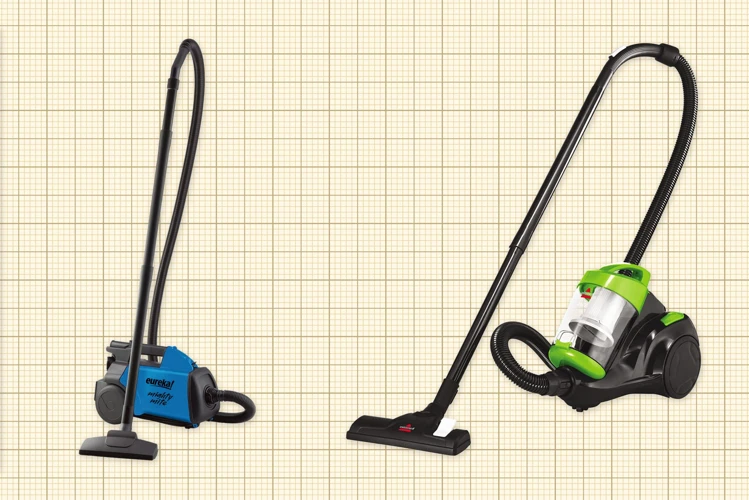
Canister vacuum cleaners with HEPA filters offer numerous benefits over regular vacuum cleaners. These benefits are related to the powerful filtration system, effective dust and dirt removal, and improved air quality. Let’s take a closer look at each of these advantages.
Powerful Filtration
Canister vacuum cleaners with HEPA filters are designed to capture even the smallest particles that regular vacuum cleaners cannot. These filters are capable of trapping tiny pollutants such as dust mites, pollen, pet dander, and other allergens that can trigger allergy symptoms.
Effective Dust and Dirt Removal
Canister vacuum cleaners with HEPA filters are also highly effective at removing dust and dirt from carpets, upholstery, and other surfaces. The powerful suction feature of these vacuum cleaners ensures that even stubborn dirt is removed from carpets and floors. Additionally, the canister design makes it easier to clean hard-to-reach areas such as corners, edges, and under furniture.
Improved Air Quality
Using a canister vacuum cleaner with a HEPA filter can significantly improve your indoor air quality. By trapping microscopic particles, HEPA filters prevent these particles from being released back into the air, making it safe to breathe. This is particularly beneficial for people with allergies or respiratory problems, as it helps reduce symptoms.
Canister vacuum cleaners with HEPA filters are a great investment for people who are looking for powerful, effective, and efficient cleaning. These vacuum cleaners not only help eliminate allergy symptoms but also purify the air and are easy to maintain.
Powerful Filtration
When it comes to cleaning your home, having a vacuum cleaner with powerful filtration is crucial. It ensures that all dirt, dust, and allergens are effectively removed from your floors and carpets, leaving your living environment clean and healthy. But what makes canister vacuum cleaners with HEPA filters stand out from the rest? Let’s dive into the details to discover how they provide the ultimate cleaning power.
Effective Dust and Dirt Removal
When it comes to cleaning your home, one of the biggest challenges is removing dirt and dust. Fortunately, canister vacuum cleaners with HEPA filters are designed to make this task easier and more effective. Here are a few key reasons why:
– HEPA filters trap microscopic particles: Unlike standard filters, HEPA filters can capture particles that are as small as 0.3 microns in size. This means that they can effectively capture dust and dirt that might otherwise be missed by other vacuum cleaners.
– Powerful suction: Canister vacuum cleaners with HEPA filters are often equipped with powerful suction that can pull dirt and dust out of carpets, upholstery, and other surfaces. This means that they can remove even more dirt and dust than other vacuum cleaners.
– Multi-surface cleaning: Many canister vacuum cleaners with HEPA filters are designed to be used on a variety of surfaces, including hardwood floors, carpets, and upholstery. This means that you can use a single vacuum cleaner to clean your entire home.
– Advanced cleaning tools: Canister vacuum cleaners with HEPA filters often come with a variety of advanced cleaning tools, such as crevice tools, dusting brushes, and pet hair attachments. These tools can be used to clean tight spaces, remove dust from hard-to-reach areas, and pick up pet hair.
Canister vacuum cleaners with HEPA filters are an excellent choice for effective dust and dirt removal. With powerful suction, advanced cleaning tools, and the ability to capture microscopic particles, these vacuum cleaners can help keep your home cleaner and healthier.
Improved Air Quality
One of the primary benefits of using canister vacuum cleaners with HEPA filters is the improvement in air quality. HEPA filters are capable of trapping microscopic particles that can cause various health issues such as allergies, asthma, and other respiratory problems.
The improved air quality can be attributed to the ability of HEPA filters to capture harmful particles such as dust mites, pollen, pet dander, and even bacteria that can linger in the air. These particles can be especially harmful to individuals who spend a lot of time indoors, such as children and the elderly.
Using a canister vacuum cleaner with a HEPA filter ensures that the air inside your home is cleaner and safer to breathe. This can be especially beneficial for those with allergies or asthma, as it reduces the risk of exposure to irritants that can cause symptoms.
Additionally, improved air quality can lead to a more comfortable living environment. It can help reduce odors and eliminate the need for air fresheners or other chemicals that can be harmful to the respiratory system.
To summarize, using canister vacuum cleaners with HEPA filters can greatly improve air quality by trapping harmful particles in the filter instead of circulating them back into the air. This benefits not only individuals with allergies or respiratory problems but also everyone who values a clean and healthy living environment.
HEPA vs Non-HEPA Filters
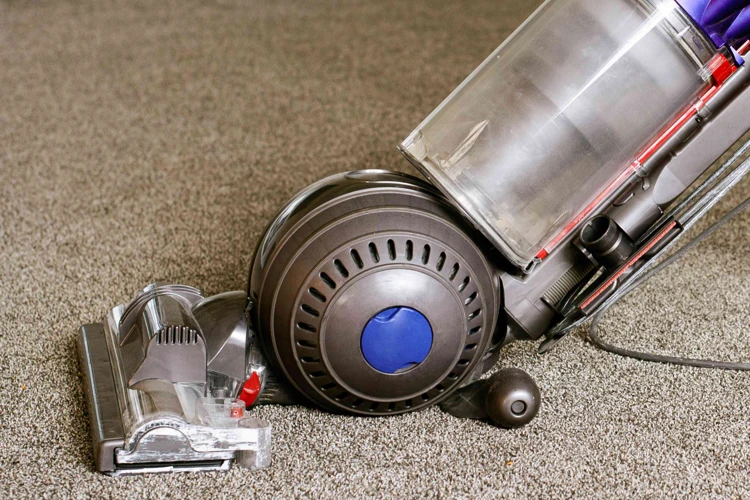
When it comes to choosing a vacuum cleaner, one of the most important factors to consider is the type of filter it uses. Two common types of filters are HEPA and non-HEPA filters. Let’s take a closer look at the differences between these two types of filters.
HEPA Filters: HEPA stands for High Efficiency Particulate Air. A HEPA filter is a type of filter that is designed to trap 99.97% of all particles that are 0.3 microns or larger. This makes HEPA filters highly effective at capturing dust, pollen, pet dander, and other allergens that can cause respiratory problems. HEPA filters are made up of tightly woven fibers that form a maze-like path for air to flow through. As air moves through the filter, the fibers trap the particles, preventing them from escaping back into the air.
Non-HEPA Filters: Non-HEPA filters are any filters that do not meet the strict HEPA standards. These filters are often made of foam, felt, or another type of porous material that allows air to flow through while capturing larger particles like hair and dirt. However, non-HEPA filters are not as effective at capturing smaller particles like pollen and dust.
While non-HEPA filters can be effective for capturing larger particles, they are not ideal for people who suffer from allergies or respiratory issues. HEPA filters, on the other hand, are highly effective at capturing even the smallest particles, making them the better choice for people with allergies or asthma.
It’s important to note that not all vacuum cleaners with “HEPA” in the name actually use a true HEPA filter. Some manufacturers use the term “HEPA-like” or “HEPA-style” to describe their filters, which may not meet the strict HEPA standards. When choosing a vacuum cleaner, it’s important to look for models that use true HEPA filters to ensure maximum filtration efficiency.
When it comes to vacuum filters, HEPA filters are the clear winner. They are highly effective at capturing all types of allergens, making them the best choice for people with allergies or respiratory issues.
HEPA Filters
Are you aware of the difference between HEPA and non-HEPA filters? If not, it’s time to familiarize yourself with these two types of filtration systems. HEPA filters are a significant breakthrough in the field of air purification and are widely used in the manufacturing of canister vacuum cleaners. The word “HEPA” stands for High-Efficiency Particulate Air, which means that these filters are designed to capture tiny airborne particles with a high level of efficiency. In this section, we will discuss the benefits of HEPA filters and how they differ from non-HEPA filters. So, let’s dive deep and discover the magic of HEPA filters.
Non-HEPA Filters
When it comes to vacuum cleaners, there are two types of filters available in the market – HEPA filters and Non-HEPA filters. Non-HEPA filters are often cheaper than their HEPA counterparts, but they are also less efficient in filtering out particles.
Here are some key points regarding non-HEPA filters:
- Non-HEPA filters can capture larger particles like dust and dirt but are not suitable for filtering small allergens.
- Non-HEPA filters tend to clog more easily, reducing the vacuum’s suction power, and they need to be replaced more frequently.
- Non-HEPA filters are typically made of foam or felt material that captures larger particles, but they cannot trap tiny particles like pollen, dust mites, or pet dander because the filter’s fibers are far apart from each other.
- Non-HEPA filters can also release microscopic particles back into the air during vacuuming, which can be hazardous for people who suffer from allergies.
- Non-HEPA filters can become breeding grounds for bacteria and mold, causing an even larger indoor air quality issue.
While non-HEPA filters may be cheaper, they are not as effective as HEPA filters when it comes to purifying your indoor atmosphere. If you or someone in your household is suffering from allergies or respiratory issues, it would be wise to invest in a high-quality canister vacuum cleaner with a HEPA filter.
HEPA Filters Maintenance
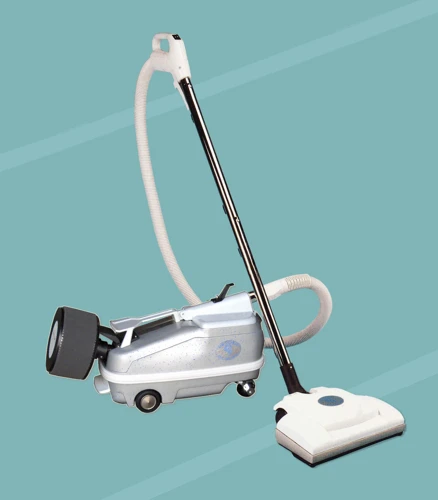
Maintaining your HEPA filter is crucial if you want to get the most out of your canister vacuum cleaner. A dirty or clogged filter can severely impact the performance of your vacuum cleaner and even cause it to malfunction. In this section, we’ll go over some important tips for maintaining your HEPA filter.
How Often Should You Change Your HEPA Filter?
The frequency with which you need to change your HEPA filter largely depends on how often you use your vacuum cleaner. As a general rule, it’s recommended that you change your HEPA filter every six months to a year. However, if you have pets or are prone to allergies, you may need to change it more frequently – every three to four months.
How Do You Clean a HEPA Filter?
While some vacuum cleaners have washable HEPA filters, most are disposable and need to be replaced. If your HEPA filter is washable, you should clean it regularly to maintain its efficiency.
To clean a washable HEPA filter, start by removing it from your vacuum cleaner. Next, gently tap it to remove any loose dust and debris. Then, rinse the filter under running water, making sure to distribute the water evenly over the entire filter. Use a mild dish soap to gently clean the filter, being careful not to scrub too hard. Rinse the filter thoroughly and let it dry completely before reinstalling it.
Types of Canister Vacuum Cleaners with HEPA Filters
When it comes to canister vacuums with HEPA filters, you’ll find that there are several types on the market. Two of the most common types are bagged and bagless canister vacuums.
Bagged Canister Vacuum Cleaners
Bagged canister vacuums are the traditional type of canister vacuum cleaner. They use disposable bags to collect dirt and debris, which helps to keep the inside of the vacuum cleaner clean. These vacuums typically have large bags that need to be replaced every few months.
Bagless Canister Vacuum Cleaners
Bagless canister vacuums are becoming increasingly popular. These vacuums don’t use bags; instead, they have a dustbin that you empty when it’s full. These vacuums tend to be more expensive than bagged vacuums, but they’re more environmentally friendly since you don’t need to purchase replacement bags.
Corded vs Cordless Canister Vacuum Cleaners with HEPA Filters
Another important factor to consider when choosing a canister vacuum with a HEPA filter is whether you want a corded or cordless vacuum. Corded vacuums tend to be more powerful, but they’re less convenient since you need to be near an outlet to use them. Cordless vacuums, on the other hand, are more convenient but tend to be less powerful.
Conclusion
Taking care of your HEPA filter is crucial if you want your canister vacuum cleaner to perform at its best. By following the tips outlined in this section, you should be able to ensure that your HEPA filter is always clean and free of debris, which will help to improve the performance of your vacuum cleaner and keep your home free of dust and allergens. Remember to choose the right type of canister vacuum cleaner with a HEPA filter that suits your specific needs and preferences.
How Often Should You Change Your HEPA Filter?
Maintaining your canister vacuum cleaner with a HEPA filter can significantly extend its lifespan and ensure optimal performance. However, many people struggle with the question of how often they should replace their HEPA filter. Factors such as usage, air quality, and the size of your home can impact the durability of your filter, leading to confusion and frustration. In this section, we’ll explore the different factors that determine when it’s time for a HEPA filter replacement and offer some tips for maintaining its longevity. So, if you’ve been wondering how often you should change your HEPA filter, keep reading!
How Do You Clean a HEPA Filter?
Cleaning your HEPA filter is an essential part of maintaining your canister vacuum cleaner. While most vacuum cleaners come with an indicator that tells you when it’s time to replace your filter, cleaning your filter can help you save money in the long run. Here are the steps to follow for cleaning your HEPA filter:
| Step | Description |
|---|---|
| Step 1: | Start by removing the filter from your canister vacuum cleaner following the instructions in the manual. |
| Step 2: | If your vacuum cleaner has a pre-filter, remove it and clean it with a soft brush or rinse it with water. Allow the pre-filter to dry completely before reinstalling it. |
| Step 3: | Take the HEPA filter outside and gently tap it against a hard surface to remove larger debris, dirt, and dust. This will help to dislodge these particles from the filter. |
| Step 4: | Use a soft brush to remove any remaining dirt or debris from the filter. Be gentle and use a soft bristle brush to avoid damaging the filter. |
| Step 5: | Wash the filter with water. It is important to check the manual to ensure that washing the filter with water is recommended by the manufacturer. |
| Step 6: | Gently squeeze or shake the filter to remove excess water. |
| Step 7: | Allow the filter to air dry fully, which can take several hours or overnight depending on the size of the filter. |
| Step 8: | Reinstall the filter back into the vacuum cleaner following the instructions in the manual. |
Remember to always check your manual when cleaning your HEPA filter, as different vacuum cleaners can have slightly different instructions. Cleaning your filter regularly will ensure that your canister vacuum cleaner continues to function effectively and maintain the highest air quality in your home.
Types of Canister Vacuum Cleaners with HEPA Filters
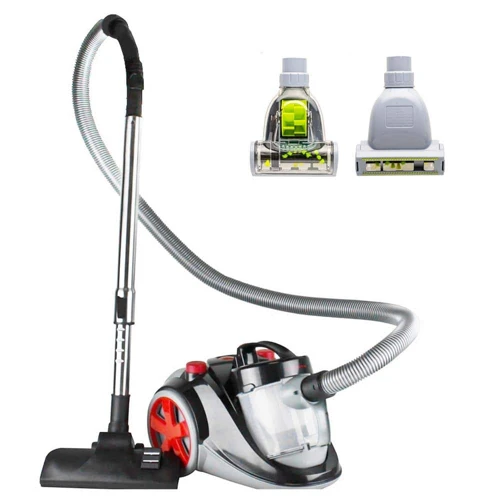
When it comes to choosing a canister vacuum cleaner with HEPA filters, there are a few types to consider. Each has its own pros and cons, so it’s important to choose the one that fits your specific needs.
Bagged Canister Vacuum Cleaners: These types of canister vacuum cleaners come with disposable bags that catch the dirt and dust. The bags must be replaced once they are full or about once in two months, which means that it can generate some waste. However, they are hygienic and easy to dispose of, as the bags seal in the dust and dirt, keeping the air clean. Plus, they tend to have a larger capacity for holding dirt than bagless models.
Bagless Canister Vacuum Cleaners: These canister vacuum cleaners come with a container that collects the dust and dirt. They don’t require disposable bags, which reduces waste and can save money in the long run. However, over time, the filters can get clogged or dirty, which will affect the vacuum’s suction power. The filters need to be cleaned and replaced from time to time, and the container needs to be emptied more frequently than with bagged models.
Corded vs Cordless Canister Vacuum Cleaners with HEPA Filters: Corded canister vacuum cleaners tend to be more powerful and can run for an unlimited amount of time as long as they are plugged in. Cordless canister vacuum cleaners are more convenient to use and maneuver, but they may not have the same suction power as corded models, and battery life can be limited.
Consider the type of flooring in your home, as well as the size of your living space, to determine which type of canister vacuum cleaner is best for you. If you have a large home with a lot of carpets and thick rugs, you may want to consider a bagged canister vacuum cleaner with a larger capacity. If you have a small apartment with hardwood floors, a cordless canister vacuum cleaner may be a better fit.
No matter what type of canister vacuum cleaner with HEPA filter you choose, make sure it has enough suction power and an efficient filtration system to capture not only dust and dirt but also allergens and other airborne particles.
Bagged Canister Vacuum Cleaners
When it comes to choosing a canister vacuum cleaner with a HEPA filter, one of the main considerations is whether to opt for a bagged or bagless design. While both types have their benefits and drawbacks, bagged canister vacuum cleaners have been around for decades and remain a popular choice for many homeowners. But why should you consider a bagged canister vacuum cleaner with a HEPA filter? Let’s delve into the advantages and peculiarities of this type of vacuum cleaner.
Bagless Canister Vacuum Cleaners
When it comes to canister vacuum cleaners with HEPA filters, there are two main types to choose from: bagged and bagless. Bagless canister vacuum cleaners are becoming increasingly popular due to their ease of use and cost-effectiveness. Here are some of their advantages:
- Easy to Clean: With a bagless canister vacuum cleaner, you don’t have to worry about replacing bags. Instead, the dust and debris are collected in a transparent container, making it easy to see when it’s time to empty it out.
- Cost-Effective: Bagless canister vacuum cleaners can save you money in the long run since you don’t have to buy replacement bags.
- Saves Time: Since you don’t have to replace bags, you save time and effort that you would have spent on opening and disposing of the bags.
- Better Filtration: Bagless canister vacuum cleaners have HEPA filters that prevent the release of any allergens back into the air, providing you with better air quality.
However, there are some disadvantages to consider before purchasing a bagless canister vacuum cleaner:
- Messy to Empty: Emptying a bagless canister vacuum cleaner can be a messy process, especially if you have allergies or respiratory issues.
- More Maintenance: Bagless canister vacuum cleaners require more maintenance since you have to clean the filters regularly and empty the container after each use.
- Noisy Operation: Bagless canister vacuum cleaners tend to be noisier than their bagged counterparts, which can be a problem if you have sensitive ears or live in a shared space.
Bagless canister vacuum cleaners with HEPA filters can be a great investment for those looking for a cost-effective and easy-to-use cleaning solution. However, make sure to consider both the advantages and the disadvantages before making your final decision.
Corded vs Cordless Canister Vacuum Cleaners with HEPA Filters
When it comes to choosing a canister vacuum cleaner with a HEPA filter, one of the factors to consider is whether to go with a corded or cordless model. Corded canister vacuum cleaners are more traditional and rely on being plugged into an electrical outlet in order to function. They offer the benefit of unlimited runtime and consistent suction power, which is important for tackling larger cleaning tasks. Additionally, corded models tend to have more powerful motors and are better suited for deep cleaning tasks.
Cordless canister vacuum cleaners, on the other hand, operate on rechargeable batteries and offer greater flexibility and convenience. They are more lightweight and portable, making them ideal for spot cleaning or quick pickups. Additionally, cordless models are ideal for cleaning hard-to-reach areas or areas where there are no electrical outlets nearby. However, battery life and suction power can be a limiting factor for cordless models, and they may not be the best choice for larger homes or deep cleaning tasks.
It’s important to note that both corded and cordless canister vacuum cleaners can be equipped with HEPA filters. When shopping for a canister vacuum with a HEPA filter, it’s important to consider your cleaning needs and habits. If you have a larger home and require deep cleaning, a corded model may be the better choice. However, if flexibility and portability are more important to you, a cordless model may be the way to go.
Ultimately, the decision between a corded or cordless canister vacuum cleaner with a HEPA filter comes down to personal preference and cleaning needs. Consider your specific needs and do your research before making a purchase to ensure you select the right vacuum for your home.
Benefits of Using Canister Vacuum Cleaners with HEPA Filters
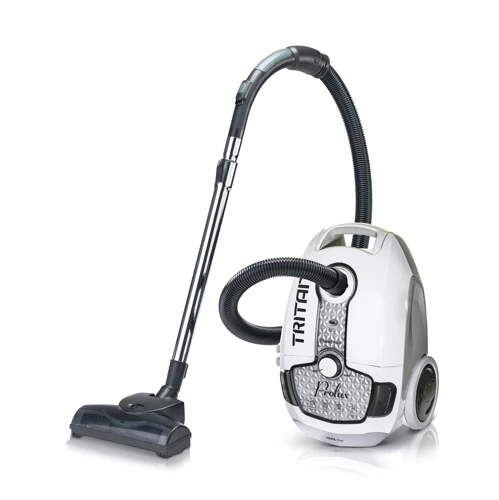
Using canister vacuum cleaners with HEPA filters offers numerous benefits, making it an essential tool for maintaining a clean and healthy home environment. Let’s dive into some of the benefits in more detail:
Eliminates Allergy Symptoms
One of the most significant benefits of using a canister vacuum cleaner with a HEPA filter is the elimination of allergy symptoms. HEPA filters are designed to remove dust, pollen, pet dander, and other common allergens from the air, making it easier for allergy sufferers to breathe. By using a canister vacuum cleaner with a HEPA filter, you’ll significantly reduce the number of allergens in your home, providing relief for allergy symptoms.
Purifies Air
Canister vacuum cleaners with HEPA filters don’t just remove allergens from the air; they also purify it. HEPA filters are highly effective in removing airborne pollutants such as smoke, bacteria, and viruses. The result is cleaner air that’s safe to breathe. Additionally, with a canister vacuum cleaner’s strong suction power, you can be sure that dirt and dust particles are effectively being removed from your floors, carpets, and upholstered furniture.
Easy to Maintain
Another benefit of using a canister vacuum cleaner with a HEPA filter is that it’s easy to maintain. With proper care, HEPA filters can last for years, and they only need to be replaced every six months to two years, depending on usage. Also, most canister vacuums with HEPA filters come with washable filters, reducing the cost of having to replace filters frequently.
Using canister vacuum cleaners with HEPA filters is a practical and efficient way to maintain a clean and healthy home. Not only do they eliminate allergy symptoms and purify the air, but they’re also easy to maintain, making it a worthwhile investment for anyone looking to improve their indoor air quality.
Eliminates Allergy Symptoms
For allergy sufferers, the air around them can be a source of constant discomfort. Sneezing, coughing, and itchy eyes can make daily life unbearable. But what if there was a way to eliminate these symptoms entirely? Canister vacuum cleaners with HEPA filters might just be the solution many allergy sufferers have been searching for. By removing allergens such as pollen, dust mites, and pet dander from the air, these vacuum cleaners can provide relief and help create a more comfortable living space. Let’s explore the benefits of using canister vacuum cleaners with HEPA filters in more detail.
Purifies Air
When shopping for a vacuum cleaner, many people prioritize suction power and dust/dirt capacity over air quality. However, the air quality within your home is just as important as the cleanliness of your floors. This is why choosing a canister vacuum cleaner with a HEPA filter can make a significant impact on the air quality in your home.
HEPA filters are designed to capture 99.97% of particles that are 0.3 microns or larger. This includes common allergens such as dust mites, pollen, and pet dander. Using a canister vacuum cleaner with a HEPA filter can help remove these allergens from the air, which can alleviate allergy symptoms and improve overall air quality.
But how exactly does a HEPA filter purify the air? It’s all about the design. HEPA filters are made up of randomly arranged, fiberglass fibers that trap the particles as they pass through. The particles stick to the fibers rather than being released back into the air. This keeps the air inside your home cleaner and healthier to breathe.
Using a canister vacuum cleaner with a HEPA filter can also help reduce the spread of germs and viruses within your home. This is particularly important during cold and flu season when viruses can easily spread through the air.
Table:
| Benefits of Using Canister Vacuum Cleaners with HEPA Filters | How They Purify Air |
|---|---|
| Eliminates Allergy Symptoms | Traps allergens, such as dust mites, pollen, and pet dander |
| Purifies Air | Removes particles from the air, keeping it clean and healthy to breathe |
| Easy to Maintain | Cleaning and changing the HEPA filter as needed ensures continued efficient filtration |
Using a canister vacuum cleaner with a HEPA filter may cost more initially, but the benefits in terms of air quality are well worth the investment. By going the extra mile to purify the air in your home, you can reduce allergy symptoms, promote good health, and breathe easier.
Easy to Maintain
Canister vacuum cleaners with HEPA filters are not only effective in cleaning and purifying the air, but they are also remarkably easy to maintain. One of the main reasons for this is that most canister vacuum cleaners with HEPA filters feature washable filters, which can be easily removed and cleaned. This eliminates the need for constant replacement of filters, which can be both costly and time-consuming.
Canister vacuum cleaners with HEPA filters are designed to be user-friendly and easy to operate. They typically come with straightforward instructions that are easy to follow, so even novices can use them without difficulty. Additionally, these vacuum cleaners often have simple mechanisms that make it easy to disassemble and reassemble the machine, making cleaning and maintenance a breeze.
Canister vacuum cleaners with HEPA filters often include indicators that alert users when it’s time to clean or change the filter. These indicators help ensure that the filters are always in good condition and functioning properly. Many models come with additional tools and accessories that aid in the cleaning process and make it easy to reach difficult spaces.
The ease of maintenance of canister vacuum cleaners with HEPA filters is due to:
- Washable filters that can be easily cleaned and reused
- User-friendly design with simple instructions
- Easy-to-disassemble and reassemble mechanisms
- Filter indicators that keep track of when to clean or replace the filter
- Add-on tools and accessories that make cleaning easier and effective
By choosing a canister vacuum cleaner with a HEPA filter, homeowners are investing in an appliance that is easy to maintain and can help improve the indoor air quality in their homes. With all the advantages that come with using these vacuum cleaners, maintaining them becomes a small task that is well worth the effort.
Tips for Choosing the Best Canister Vacuum Cleaner with a HEPA Filter
When choosing the best canister vacuum cleaner with a HEPA filter, it is important to consider several factors.
Consider the Size of Your Home:
If you live in a small apartment or a condo, a compact canister vacuum cleaner with a HEPA filter will do the job. However, if you have a large house or a multi-story building, a powerful canister vacuum cleaner with a HEPA filter and a long cord will be more effective. Look for models with long hoses and power cords, so that you can easily move around from room to room without having to unplug and re-plug the vacuum.
Choose the Right Type of Canister Vacuum Cleaner:
There are two main types of canister vacuum cleaners with HEPA filters: bagged and bagless. Bagged vacuums typically hold more dirt and debris, and they are less messy to empty. Bagless vacuums, on the other hand, are more convenient because you don’t have to buy replacement bags. Some models also come with washable filters, which can save you money in the long run.
Check the Noise Level and Power Consumption:
If you live in an apartment or have small children at home, you may want to consider a canister vacuum cleaner with a HEPA filter that operates quietly, so as not to disturb your neighbors or wake up your children from their nap. Choose a vacuum cleaner that has a low power consumption to save on your energy bill.
Consider the Price:
While canister vacuum cleaners with HEPA filters can be more expensive than those without, they are an investment in your health and the cleanliness of your home. However, there are still models available within a reasonable price range that offer strong suction power and effective cleaning capabilities.
Look for Additional Features:
Other features to consider when choosing a canister vacuum cleaner with a HEPA filter include a telescoping wand for hard-to-reach areas, adjustable suction settings for different surfaces, and a motorized brush for cleaning carpets and upholstery. Additionally, some models may have attachments for pet hair or a crevice tool for tight spaces.
Choosing the best canister vacuum cleaner with a HEPA filter may seem overwhelming at first, but by considering these factors, you can narrow down your options and find the perfect vacuum for your needs.
Consider the Size of Your Home
When it comes to choosing the right canister vacuum cleaner with a HEPA filter, the size of your home plays a crucial role. You want to ensure that the vacuum you select is powerful enough to effectively clean your entire home while also considering factors such as storage space and maneuverability. Let’s dive deeper into why the size of your home should be a key consideration when choosing a canister vacuum cleaner with a HEPA filter.
Choose the Right Type of Canister Vacuum Cleaner
When choosing a canister vacuum cleaner with a HEPA filter, it is important to consider the different types available to make sure you get the one that best fits your needs. Below are some things to keep in mind when deciding which type of canister vacuum cleaner to choose:
- Bagged or Bagless: The first decision to make is whether you want a bagged or bagless canister vacuum cleaner. Bagged vacuum cleaners can hold more dirt and require less frequent maintenance, but you’ll need to buy replacement bags. Bagless vacuum cleaners don’t require bags, which saves you money in the long run, but you’ll need to empty the dust canister more frequently.
- Corded or Cordless: Another consideration is whether you want a corded or cordless canister vacuum cleaner. Cordless vacuum cleaners are more convenient and portable, but they have a shorter battery life and may not be as powerful as corded models. Corded vacuum cleaners are more powerful and can be used for longer periods of time without needing to recharge the battery.
- Attachments: You should also consider the attachments that come with the canister vacuum cleaner. Look for a model that comes with a variety of attachments suited to cleaning different areas of your home. For example, you may want an attachment for cleaning upholstery or dusting hard-to-reach places.
- Size and Weight: Finally, consider the size and weight of the canister vacuum cleaner you are interested in. If you have a small home or apartment, you may not need a large, heavy vacuum cleaner that is difficult to maneuver. Similarly, if you plan to use the vacuum cleaner frequently, you may want to choose a lighter model that is easy to carry around.
By keeping these factors in mind and choosing the type of canister vacuum cleaner that best fits your needs, you can ensure that you make an informed decision and choose the right vacuum cleaner for your home.
Check the Noise Level and Power Consumption
When choosing a canister vacuum cleaner with a HEPA filter, it is essential to consider certain factors such as the noise level and power consumption. These features can have a significant impact on your cleaning experience and the overall efficiency of the vacuum cleaner.
Firstly, the noise level of a vacuum cleaner can be a crucial factor to consider, especially if you have young children or pets in your home. No one wants to wake up a sleeping baby or a scared pet with the loud noise of a vacuum cleaner. It is important to choose a vacuum cleaner with a low noise level, usually rated in decibels (dB). Generally, canister vacuum cleaners with HEPA filters tend to produce lower noise levels than other models. Consider a canister vacuum cleaner with a noise level below 70 dB, which is generally considered to be relatively quiet.
Another significant factor you have to consider when buying a canister vacuum cleaner is the power consumption. Energy-efficient vacuum cleaners can help reduce your energy bills while still providing an excellent cleaning performance. Canister vacuums with HEPA filters are typically designed to be energy-efficient by incorporating features such as adjustable suction levels and brush-roll controls. However, you should still compare power consumption across different models to find the most efficient vacuum cleaner for your needs.
Here’s a table highlighting the importance of checking the noise level and power consumption when choosing a canister vacuum cleaner with a HEPA filter:
| Factor | Importance |
|---|---|
| Noise Level | Choosing a vacuum cleaner with a low noise level (below 70 dB) can help maintain a peaceful environment in your home. |
| Power Consumption | Energy-efficient vacuum cleaners can help reduce energy bills while still providing effective cleaning performance. Look for adjustable suction and brush-roll controls to ensure power is used efficiently. |
When choosing a canister vacuum cleaner with a HEPA filter, you must consider important factors such as the noise level and power consumption. An efficient and quiet vacuum cleaner can significantly enhance your cleaning experience while also helping you maintain a peaceful environment in your home.
Conclusion
In conclusion, it is clear that HEPA filters are a vital component of canister vacuum cleaners, providing numerous advantages to homeowners. Investing in a canister vacuum cleaner with a HEPA filter can help those with allergies or respiratory issues breathe easier, as these filters are capable of capturing even the tiniest particles that cause irritation.
Furthermore, canister vacuum cleaners with HEPA filters have powerful filtration systems that effectively remove dust and dirt from floors and carpets, improving overall air quality. By choosing the right type of canister vacuum cleaner with a HEPA filter and considering factors such as the size of your home, noise level, and power consumption, you can enjoy the benefits of a clean and healthy environment without breaking the bank.
It’s important to note that while HEPA filters last longer than other types of filters, they still need to be maintained properly for optimal performance. Don’t forget to change your HEPA filter regularly and to clean it thoroughly at least once a month to keep it functioning at its best.
Ultimately, canister vacuum cleaners with HEPA filters provide a great solution for homeowners looking to keep their homes clean and healthy. From their powerful filtration systems to easy maintenance and a variety of types to choose from, a canister vacuum cleaner with a HEPA filter is a smart investment for anyone wanting to improve the air quality in their home and reduce allergy symptoms.
Frequently Asked Questions
1. Can HEPA filters remove odors from the air?
No, HEPA filters are designed to capture particles such as dust, pollen, and pet dander. To remove odors, you’ll need to use an air purifier with an activated carbon filter.
2. Can HEPA filters remove cigarette smoke from the air?
Yes, HEPA filters can capture smoke particles, but they may not be effective in removing the smell of smoke from the air.
3. How often should I change my HEPA filter?
You should change your HEPA filter every six months to a year, depending on how often you use your vacuum cleaner.
4. Can I clean my HEPA filter instead of replacing it?
Yes, but only if the manufacturer’s instructions specify that the filter is washable. Otherwise, you should replace it as directed.
5. How can I tell if my canister vacuum cleaner has a HEPA filter?
Look for the HEPA label or check the product specifications to see if the vacuum cleaner comes with a HEPA filter installed.
6. Do all canister vacuum cleaners come with HEPA filters?
No, not all canister vacuum cleaners come with HEPA filters. Some models may use other types of filtration systems.
7. What is the difference between a bagged and a bagless canister vacuum cleaner?
A bagged canister vacuum cleaner uses replaceable bags to collect dust and debris, while a bagless vacuum cleaner uses a dustbin that can be emptied and reused.
8. Can cordless canister vacuum cleaners with HEPA filters provide the same cleaning power as corded models?
Not always. Corded models tend to have more powerful motors than their cordless counterparts, which can affect their overall cleaning performance.
9. How can using a canister vacuum cleaner with a HEPA filter benefit my health?
HEPA filters can remove allergens and other harmful particles from the air, reducing the risk of respiratory problems and allergy symptoms.
10. Are canister vacuum cleaners with HEPA filters more expensive than those without?
Yes, generally speaking, canister vacuum cleaners with HEPA filters tend to be more expensive due to the cost of the filters and the advanced filtration system.

